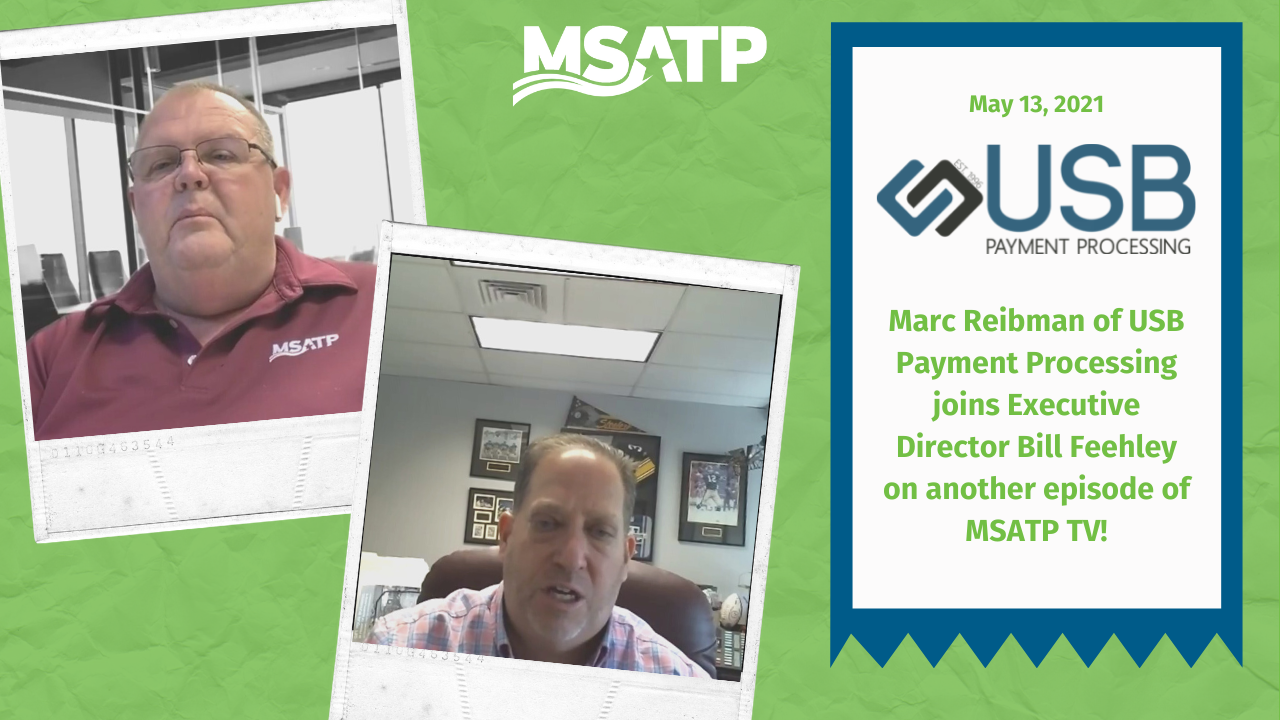

On this weeks’ episode of MSATP TV Marc Reibman of USB Payment Processing joins Executive Director Bill Feehley for an exciting new service they are offering to reduce those credit card processing fees!
Watch on YouTube.
Coming Up: On Thursday, May 20th at 10 a.m., MSATP President Barbara Smith will join Bill Feehley on MSATP TV to tell us about the Employee to Entrepreneur meeting coming up on June 15th.Tune in on Facebook for this episode and more!
IRS Extends Deadline to Apply for the 2022-2024 Volunteer Taxpayer Advocacy Panel | IR-2021-109
The Internal Revenue Service has extended the deadline for civic-minded volunteers to apply for membership on the Taxpayer Advocacy Panel (TAP) for 2022. Taxpayers may submit a TAP application online at www.improveirs.org through June 1, 2021.
The TAP is a federal advisory committee that listens to taxpayers, identifies major taxpayer concerns and makes recommendations for improving IRS service and customer satisfaction.
Taxpayers are encouraged to take this opportunity to make a difference in how the IRS delivers products and services. A video is available with information about the TAP and how to contribute to this dynamic group of volunteers.
For more information, please click here.
IRS Offers Overview of Tax Provisions in American Rescue Plan; Retroactive Tax Benefits Help Many People Now Preparing 2020 Returns | IR-2021-106
The Internal Revenue Service today provided an overview of some of the key tax provisions in the American Rescue Plan Act.
Several provisions affect the 2020 tax return people are filling out this filing season, including one exempting up to $10,200 in unemployment compensation from tax and another benefiting many people who purchased subsidized health coverage through either federal or state Health Insurance Marketplaces. In addition, the law also includes a third round of Economic Impact Payments, now going out to eligible Americans, that are generally equal to $1,400 per person for most people, as well as several other key changes for tax-year 2021.
For more information, click here.
IRS Grants Dyed Diesel Fuel Penalty Relief Due to Disruptions of the Fuel Supply Chain | IR-2021-108
The Internal Revenue Service, in response to disruptions of the fuel supply chain, will not impose a penalty when dyed diesel fuel is sold for use or used on the highway in the States of Alabama, Delaware, Georgia, Florida, Louisiana, Maryland, Mississippi, North Carolina, Pennsylvania, South Carolina, Tennessee, Virginia, and the District of Columbia.
This relief is retroactive to May 7, 2021, and will remain in effect through May 21, 2021.
This penalty relief is available to any person that sells or uses dyed diesel fuel for highway use. In the case of the operator of the vehicle in which the dyed diesel fuel is used, the relief is available only if the operator or the person selling such fuel pays the tax of 24.4 cents per gallon that is normally applied to diesel fuel for highway use.
For more information, click here.
IRS Issues Guidance on Taxability of Dependent Care Assistance Programs for 2021-2022 | IR-2021-105
The Internal Revenue Service today issued guidance on the taxability of dependent care assistance programs for 2021 and 2022, clarifying that amounts attributable to carryovers or an extended period for incurring claims generally are not taxable. The guidance also illustrates the interaction of this standard with the one-year increase in the exclusion for employer-provided dependent care benefits from $5,000 to $10,500 for the 2021 taxable year under the American Rescue Plan Act.
Because of the pandemic, many people were unable to use the money they set aside in their dependent care assistance programs in 2020 and 2021. Generally, under these plans, an employer allows its employees to set aside a certain amount of pre-tax wages to pay for dependent care expenses. The employee’s expenses are then reimbursed from the dependent care assistance program.
For more information, click here.
Filing Season Reminder: Military Members and Their Families May Qualify for Special Tax Benefits | Tax Tip 2021-65
With the filing deadline around the corner, the IRS reminders members of the military that they may qualify for special tax benefits. For example, they don’t have to pay taxes on some types of income. Special rules may lower the tax they owe or allow them more time to file and pay their federal taxes.
Here are some of these special tax benefits:
- Combat pay exclusion: If someone serves in a combat zone, part or all of their pay is tax-free. This also applies to people working in an area outside a combat zone when the Department of Defense certifies that area is in direct support of military operations in a combat zone. There are limits to this exclusion for commissioned officers.
- Other nontaxable benefits: Base allowance for housing, base allowance for subsistence and uniform allowances are among several government pay items excluded from gross income, which means they are not taxed.
- Moving expenses: Some non-reimbursed moving expenses may be tax deductible. To deduct these expenses, the taxpayer must be a member of the Armed Forces on active duty and their move must be due to a military order or result of a permanent change of station.
- Deadline extensions: Some members of the military – such as those who serve overseas – can postpone most tax deadlines. Those who qualify can get automatic extensions of time to file and pay their taxes.
- Earned income tax credit: Special rules allow military members who get nontaxable combat pay to choose to include it in their taxable income. One reason they might do this is to increase the amount of their earned income tax credit. People who qualify for this credit could owe less tax or even get a larger refund.
- Joint return signatures: Both spouses must normally sign a joint income tax return. However, if military service prevents that from happening, one spouse may be able to sign for the other or get a power of attorney. Service members may want to consult with their installation’s legal office to see if a power of attorney is right for them.
- Reserve and National Guard travel: Members of a reserve component of the Armed Forces may be able to deduct their unreimbursed travel expenses on their return. To do so, they must travel more than 100 miles away from home in connection with their performance of services as a member of the reserves.
- ROTC allowances: Some amounts paid to ROTC students in advanced training are not taxable. However, active duty ROTC pay is taxable. This includes things like pay for summer advanced camp.
Special filing software. Miltax is free tax resource available for the military community, offered through the Department of Defense. There are no income limits. MilTax includes tax preparation and electronic filing software, personalized support from tax consultants and current information about filing taxes. It’s designed to address the realities of military life – including deployments, combat and training pay, housing and rentals and multi-state filings. Eligible taxpayers can use MilTax to electronically file a federal tax return and up to three state returns for free.
Filing Season Reminder: Social Security Benefits May Be Taxable | Tax Tip 2021-66
Taxpayers receiving Social Security benefits may have to pay federal income tax on a portion of those benefits. Social Security benefits include monthly retirement, survivor, and disability benefits. They don’t include supplemental security income payments, which aren’t taxable.
The portion of benefits that are taxable depends on the taxpayer’s income and filing status.
To find out if their benefits are taxable, taxpayers should take half of the Social Security money they collected during the year and add it to their other income. Other income includes pensions, wages, interest, dividends, and capital gains.
- If they are single and that total comes to more than $25,000, then part of their Social Security benefits may be taxable.
- If they are married filing jointly, they should take half of their Social Security, plus half of their spouse’s Social Security, and add that to all their combined income. If that total is more than $32,000, then part of their Social Security may be taxable.
Fifty percent of a taxpayer’s benefits may be taxable if they are:
- Filing single, single, head of household or qualifying widow or widower with $25,000 to $34,000 income.
- Married filing separately and lived apart from their spouse for all of 2020 with $25,000 to $34,000 income.
- Married filing jointly with $32,000 to $44,000 income.
Up to 85% of a taxpayer’s benefits may be taxable if they are:
- Filing single, head of household or qualifying widow or widower with more than $34,000 income.
- Married filing jointly with more than $44,000 income.
- Married filing separately and lived apart from their spouse for all of 2020 with more than $34,000 income.
- Married filing separately and lived with their spouse at any time during 2020.
Revenue Procedure 2021-25, Inflation Adjusted Amounts for Health Savings Accounts
The IRS releases Revenue Procedure 2021-25, which provides the 2022 inflation adjusted amounts for health savings accounts and the maximum amount that may be made newly available for excepted benefit health reimbursement arrangements.
Revenue Procedure 2021-25 will be published in Internal Revenue Bulletin 2021-21 on May 24, 2021.
For more information, please click here.
TE/GE Job Announcements
The IRS has announced multiple full-time positions in the Tax Exempt/Government Entities division available across the country. These job announcements close soon, so apply today on USAJOBS.gov to become part of our team.
- Internal Revenue Agent (Employee Plans) GS 5-11
- Closes May 17, 2021
- Internal Revenue Agent (Exempt Organizations) GS 5-12
- Closes May 17, 2021
- Internal Revenue Agent (Employee Plans) GS 12
- Closes May 17, 2021
- IRS Pathways Recent Graduate Program (Staff Support Assistant) GS 5-6
- Closes May 13, 2021
We’re hosting virtual information sessions for these job openings. Hear from employees currently working in these positions and gain a better understanding of the work they do day-to-day. A representative from HR will also discuss the application process and some of the requirements for the positions.
-
- Thursday, May 13 at 2 – 3:30 p.m. ET
-
- Monday, May 17 at 4 – 5:30 p.m. ET
-
- Thursday, May 13 at 4 – 5:30 p.m. ET
Follow the IRS on social media and sign up for e-News newsletters
Everyone can follow official IRS social media accounts and sign up for e-News newsletters to get the latest alerts and information on a wide-range of tax topics.
These platforms are especially important right now. COVID 19-related relief, changes to filing and payment deadlines, and new business credits and Economic Impact Payments make these free and reliable communication channels crucial for anyone wanting the most current information.
